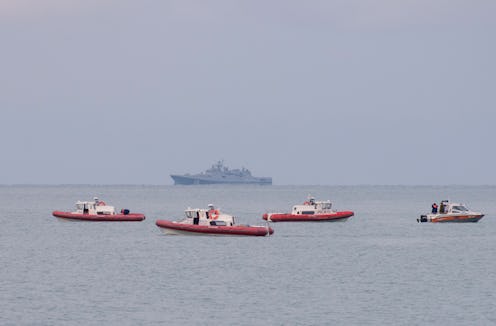News
The Search For Downed Russian Plane Continues

On Sunday, a Russian Tu-164 military plane crashed into the Black Sea off the coast near Sochi, killing all 92 people on board. The plane, which originated in Moscow, had stopped to refuel en route to a Russian base in Syria. Among the passengers were members of the Alexandrov Ensemble, the official choir of the Russian armed forces and journalists. Russian officials have ruled out terrorism as a cause, pointing instead to an equipment malfunction or pilot error. The Russian plane crash update comes as the search for bodies intensifies.
On Monday, a huge search and rescue operation continued. Some 39 ships, 135 divers, and seven deepwater submarines had worked through the night to identify bodies and wreckage. So far 13 corpses have been recovered, the Itar-Tass news agency reported. The Defense Ministry confirmed that there appear to be no survivors and went over what has been recovered thus far. "Military personnel of the Southern Military district keep examining the shoreline to find and collect the bodies, debris of the plane and personal belongings of passengers," the ministry said, noting that 3,500 people were involved in the search.
Gen. Viktor N. Bondarev told reporters at a news conference early Monday that the rescuers believe they've found where the plane hit the water, The New York Times reported. Military officials narrowed down the doomed flight trajectory and located the fragments of about 89 feet underwater one mile from the shore. "“I think today is the day when we will be able to to locate the plane at the bottom of the Black Sea," Bondarev said. He added that he expected the fin of the plane, where the flight data recorders are housed, to be in better condition than the plane's fuselage. Intact black boxes would help narrow down the cause of the crash.
The Russian transportation minister, Maxim Sokolov, also speaking at the news conference, reiterated that while terrorism has not been ruled out, it is not thought to be the cause:
In order to organize our work, we need to understand what happened. As far as we know, the main versions do not include the terrorist act so we base our work on the premise that technical malfunction or pilot’s error caused the catastrophe.
The first 10 corpses as well as more than 80 body parts were flown to Moscow for DNA analysis. More bodies could be found as far away as Abkhazia, the breakaway region of Georgia, thanks to currents, Sokolov said.
The choir, who saw more than 60 of its members perish, "has been orphaned by a third," the Russian media channel Rossiya reported. They were headed to a New Year's concert for troops in Syria. A soloist who stayed behind told the Associated Press that he has received condolences from around the world. "I have lost my friends and colleagues, all killed, all five soloists. I feel in complete disarray,” Vadim Ananyev told the news agency. “It is such a shame. I have known these people for 30 years. I know their wives and children. I feel terrible for the children and for all that I have lost.”
Given the scale of the tragedy culturally, Monday was declared a national day of mourning in the country. Those close to the choir will need even more time to grieve, and knowing what happened will be the first step to moving forward.